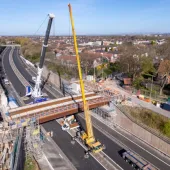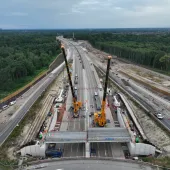ADB appproves financing for US2.1B Philippines bridge
The Asian Development Bank (ADB) has approved financing of up to US$2.1 billion (UK£947 million) for the construction of a 32.15 km bridge connecting Bataan and Cavite provinces across Manila Bay.
The ‘climate-resilient’ will help decongest Metro Manila, enable greater mobility of labour and goods, and enhance economic productivity in the country’s largest region of Luzon.
The Bataan–Cavite Interlink Bridge (BCIB) Project, one of the government’s flagship infrastructure projects, will complete the transport loop around Manila Bay and better link Metro Manila to central Luzon and nearby Cavite, Laguna, Batangas, Rizal, and Quezon provinces. The project will help boost economic activity in these areas, which together account for 60% of the country’s gross domestic product.
The project will construct one of the world’s longest marine bridges, including 2 cable-stayed bridges, 24 km of marine viaducts, and a total 8 km of approach road in the two provinces. BCIB will provide the road connectivity to Manila, Cavite, and southern Luzon that will boost Bataan’s potential to host more manufacturing industries in the Freeport Area of Bataan, the only freeport in the Manila Bay area, making it an ideal transshipment hub. The project can also help expand the use of Bataan’s Mariveles port to provide an alternative to the busy port of Manila.
The bridge will offer easier access from northern Luzon to Cavite, one of the most industrialized provinces in the country, and host to businesses in the service, export, logistics services, facilities, and information technology sectors.
The BCIB project will be financed under a multitranche financing facility, with the first tranche amounting to US$650 million (UK£512 million). The project will cut travel time between Bataan and Cavite to 1.5 hours from 5 hours, and to about 2 hours from 4 hours between Bataan and Metro Manila. The traffic decongestion in Metro Manila and the reduced travel time will help lower annual greenhouse gas emissions in the country by an estimated 79,000 tons of carbon dioxide equivalent.
The ADB-financed Infrastructure Preparation and Innovation Facility supported the project preparation, environment and social safeguards due diligence, and detailed engineering design for BCIB.







